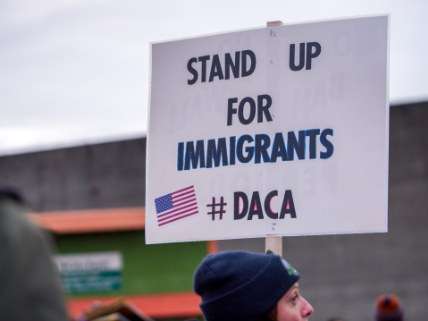Texas Bill Adds Actual Teeth to Immigration Enforcement Demands in Sanctuary Cities
Police could be punished if they don't cooperate with federal requests to detain people to deport.

President Donald Trump's efforts to force so-called "sanctuary cities" to comply with federal immigration laws ran aground earlier in the week when a federal district court judge found his executive order threatening city funding likely unconstitutional and blocked it. The courts often take a dim view at the federal government attempting to dragoon states and cities into enforcing federal laws on their behalf.
But in Texas, where many Republican lawmakers are more than willing to help deport people who are in the country illegally, there is a bill in play that would actually force law enforcement to do more to assist the feds, including cooperating with detainer requests from immigration officials.
In the wee hours of the morning, the Texas House voted, pretty much along party lines, to pass SB 4. The bill would allow the state of Texas to withhold money from cities that decline to enforce federal immigration laws and even provide for the state to charge police officials with misdemeanor misconduct if they refuse to enforce immigration law. There are also potential civil penalties against cities for each violation reaching up to more than $25,000 if the violations persist.
But it's worth asking here, "What do we mean by 'enforcing immigration law?'" because here is where the bill really matters. While the Trump administration frequently wants to present sanctuary cities as defying federal law when they refuse to detain illegal immigrants so that federal authorities can round them up for deportation, there is no requirement under federal law to assist (and it would likely be unconstitutional should such a law be crafted). The "detainer" orders from Immigration and Customs Enforcement (ICE) are just requests.
In reality, most "sanctuary cities" in the United States are not violating any federal laws at all. When the Department of Justice sent out letters threatening funding for non-compliant communities, they targeted only eight cities and one county. And even that was only because these cities were believed to be out of compliance with a federal regulation that prohibits them from stopping police from communicating with ICE or any federal agency about the immigration or citizenship status of a person. The federal regulation is about keeping lines of communication open. It doesn't require cities or local governments to actually do anything about illegal immigration.
In Texas, that all changes under SB 4. This bill specifically requires for law enforcement officials within Texas to comply with detainer orders from federal immigration officials. Failing to do so is what counts as the misdemeanor misconduct.
So SB 4 should be seen as a very significant piece of legislation. State lawmakers are passing a bill requiring that local law enforcement officials actively participate in the deportation process by holding suspected deportable immigrants on the demand of the federal government (note that the law doesn't apply if the detained person has proof of U.S. citizenship).
The law will also permit police to check the immigration status of not just anybody they arrest but anybody they detain, and critics of the law warned that this will significantly discourage immigrants who are crime victims or witnesses from cooperating with or turning to the police.
Read the law for yourself here. Because the version the House passed is significantly different from what the Senate initially crafted, SB 4 has to go back to the Senate for another vote and the two chambers need to hammer out some sort of compromise.


Show Comments (6)